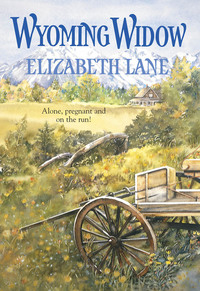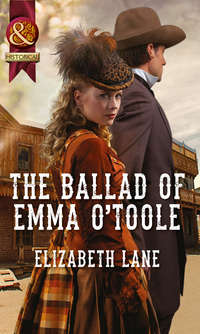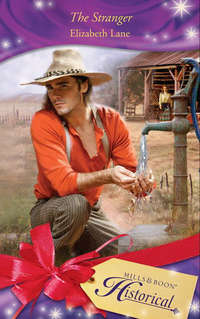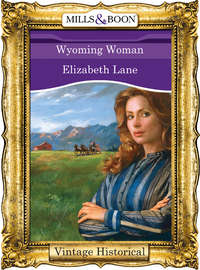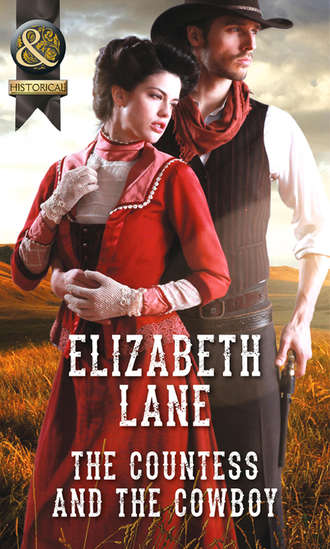
Полная версия
The Countess and the Cowboy
In her room, she gathered up her mourning dress and tore out a strip from the inner seam of the skirt for an armband. Rolling the rest of the gown into a wad, she carried it back downstairs. Today she was dressed in sky-blue cotton voile with a dainty white lace collar. The frock was airy and cool. In England, it would have been considered plain and practical, but she sensed that even this might be too fine for Lodgepole. Most of the women she’d seen in town had been clad in faded calicos and sunbonnets. Eve had even seen one woman in overalls. But then, she supposed, her own style of dress would adapt over time until she fit right in.
Roderick was waiting at the bottom of the stairs. “Let’s go and meet my pets,” he said, offering his arm. Pretending not to see the gesture, Eve swept past him. Maybe he’d only meant to be polite, but if she didn’t set boundaries now she could come to regret it later.
“You look right fetching today,” he said. “Much better than in those widow’s weeds. I hope that means you’re done with mourning your husband and are ready to get on with your life.”
She shot him a stern look over her shoulder. “I’m mourning my sister,” she said. “I saved a strip of black from the skirt to make an armband. I’ll make one for you, too, if you’d like.”
“That would be very kind of you, Eve.” His hand brushed her corseted waist as he ushered her around to the backyard.
The kennel, surrounded by a high wall of rough-sawn logs, was far enough from the house to keep odors from carrying, but close enough for the dogs to scent any strange presence. A grove of scraggly elms provided some shade. The creatures took up a hideous baying as Eve approached with Roderick. At a shrill blast on a whistle, like the one she’d heard last night, the baying subsided to whimpers.
Roderick opened the high wooden gate. Eve shrank back, expecting the dogs to rush out at her, but then saw they were inside a wire enclosure that formed part of the compound. There was also a closed storage shed and what looked to be a crude log cabin.
Standing outside the cabin was a shaggy giant of a man dressed in shapeless brown clothing and wearing a heavy silver police whistle on a leather thong around his neck.
“This is Hans, my master of hounds,” Roderick said. “He hears well enough, but he doesn’t speak. The dogs are trained to respond to the whistle.”
“Hans, I’m pleased to meet you.” Eve gave him a smile, which he returned with a shy nod. Half hidden by locks of matted gray-brown hair, his blue eyes were curiously gentle. Stepping aside, he gave Eve a full view of the dogs.
A shiver passed through her as she remembered the terror of seeing them run loose in the moonlight. There were six of them, all of a kind—huge, brindle-coated creatures with sleek, muscular bodies, long legs and heavy, drooling jaws, but of no definable breed. At the sight of Eve, they began snarling and lunging at the stout wire fence.
Roderick paid no heed. “I crossbred them myself,” he boasted. “The speed of a coursing hound, the strength of a mastiff and the tenacity of a pit bull. They have it all—best game dogs in the country. They’ll take on bear, cougar, wolf, buffalo, any creature you can name, except maybe a skunk.” He chuckled at his own joke. “I’ve been offered a small fortune for them. Seth McCutcheon, for one, would take them off my hands in a minute. But I wouldn’t part with them, or with Hans. They’re much too useful—especially with so much common riffraff moving in on our open range.”
Eve shuddered again, remembering last night. Roderick had bragged that his dogs would take on any prey. Evidently that included humans.
Taking the black silk dress from her, he passed it to Hans, who tossed it over the wire fence into the midst of the pack. There was a flurry of snarling, growling and tearing. Then they began snuffling at the fabric, filling their noses with the unfamiliar scent.
“We can go now.” Roderick guided her toward the gate. “After they’ve spent a day or two with that dress, they’ll be accustomed to your scent. Next time you won’t smell like a stranger to them.”
Next time.
Eve walked beside him in silence, struggling to forget the sight of those drooling jaws. She liked most dogs, even large hounds. But she’d never seen any as terrifying as these. Was their ferocity bred into them or had they been raised with the kind of brutality that drove them to attack?
And what was Hans’s role as Roderick’s “master of hounds”? Evidently he’d been there last night to set the dogs loose and blow a triple blast on his whistle to call them back. Did that odd giant of a man live right there in the compound with the dogs? It seemed that every hour spent here raised new questions—and a string of unpleasant answers.
Eve had been here less than a day and the dark miasma that hung over this place was already seeping into her bones. But never mind that, she was here for Margaret’s children, and here she would stay, doing everything she could to give them love and brighten their lives.
“Alice needs a few things from the store,” she said to Roderick. “I was hoping I could drive the buggy into town and take the children along for a treat.”
“That’s fine. I’ll get one of the hands to drive you.”
“I know how drive a buggy,” Eve said, holding firm. “All I need is someone to hitch up the horse. The road’s good, and it’s not much more than an hour to town. Surely I can manage that.”
Roderick frowned. “This isn’t England, Eve. Wyoming’s a dangerous place. You’ll need a man with a gun along to protect you.”
“My father taught me how to handle a rifle—and a team of horses. Just give me a weapon. I’ll be fine. And so will the children.”
His frown deepened. “Actually I have business in town today. I was planning to ride, but I can take you and the children in the buggy. We’ll go after lunch.”
Eve sighed in acquiescence. For now she would let him have his way. But she was not Margaret. She was not about to let this man control her life.
* * *
Clint had spent much of the morning looking for Anders Yost, the Dutch immigrant farmer who’d lost his calves to rancher Seth McCutcheon. Yost’s wife, Berta, a tired looking woman with a swollen belly and two small children hanging on to her apron, told him that Yost had gone into town to speak to the sheriff. The expression on her weary face revealed that she knew her husband was wasting his time.
Clint agreed. But since he’d planned on heading into town anyway, and since he needed to dissuade Yost from going after the stolen calves, he swung his horse toward Lodgepole and nudged the leggy buckskin to a gallop.
Leaving the horse at the livery stable, he walked the two blocks to the sheriff’s office. Yost wasn’t there, but Sheriff Harv Womack, gruff and paunchy, admitted he had been earlier.
“I advised him that losing a few calves was better than getting strung up from a tree.” Womack professed a neutral position between cattlemen and sodbusters, and generally avoided any involvement in their quarrels. But Clint suspected where his real loyalties lay, and had never quite trusted the man.
“I meant to tell him the same thing,” Clint said. “Do you think he listened?”
The sheriff shook his balding head. “I’m hoping he thought it over. But he left here swearing he’d get those calves back with or without my help. Maybe he’ll listen to you.”
“If I can find him before he does something stupid.” Clint turned toward the door, then remembered the other reason he’d stopped by. “Any luck tracking down those stage robbers?”
“Nope. Couple of fool kids, from what the driver told me. Apart from winging the guard and running the stage off the road, they didn’t do much harm—but you were there, weren’t you?”
“I was. Like the driver said, a couple of fool kids up to no good. They were more nervous than the passengers. I can’t imagine they’ll try it again.”
“Well, I’ve got better things to do than chase down those young galoots and slap their hands,” the sheriff said. “But if you happen to see them in town and recognize them, let me know.”
“I’ll do that.” Clint turned toward the door again, but the sheriff wasn’t finished.
“Hear tell the countess was on that stage. The driver said she was a looker.”
“She was pretty enough,” Clint hedged. “But not too friendly with us common folk. She didn’t say much.”
“Don’t suppose she’d have anything new to tell me about the robbery.”
“Not unless you just want to get her in here for a look. Sorry, but I need to find Yost.” Clint walked out before Womack could ask him anything else. He was just stepping onto the boardwalk when a black buggy passed him, going up the street. Roderick Hanford held the reins, his expression as smug as a self-satisfied cat’s. Seated beside him, looking fresh as a lily in a blue dress and chic little straw bonnet, was the countess.
Eve.
Hanford pulled up long enough to let an elderly man with a cane hobble across the street in front of the horses. By chance, the countess glanced to her right and caught sight of Clint. For an instant their gazes locked. Her sky-colored eyes widened, holding his. Ignoring the electric jolt that ripped through his body, Clint raised his hand to the brim of his Stetson, tipped his hat and turned away. But as the buggy moved on up the street, with Hanford’s children in the rear, Clint’s gaze lingered on her rigid back and elegant head.
Had she told Hanford about last night’s encounter? Clint hadn’t been able to read anything in the look she gave him, but the only safe assumption was that she had. If the countess wasn’t with him in his battle with the big ranchers—and she’d made that much clear last night—then she was against him. One of the enemy.
But right now he had other problems on his mind—like finding Anders Yost and checking out the alleged money shipment from the Cattlemen’s Association. Etta Simpkins at the bakery was always good for a bit of town gossip. Maybe she had something to pass on.
The buggy had pulled up in front of the hotel. Hanford climbed out, helped the countess to the boardwalk and boosted his children out of the back. Walking away, they looked like any happy, prosperous family—a snappily attired man, a stunning woman and two pretty youngsters dressed for an outing.
If Corrie and our baby had lived... But this was no time for thoughts of what might have been. Tearing his gaze away, Clint turned and headed for the saloon. He had to find Yost before the man made a fatal mistake.
Chapter Four
“You said you had business in town,” Eve reminded Roderick. Not that she cared a fig about his business, but she wanted to be free of his overpowering presence so she could enjoy the children.
“Yes, so I did.” Roderick glanced at his gold pocket watch. “I’m meeting with some of the other ranchers in the hotel, at two o’clock. Looks like it’s about time. You don’t mind, do you?”
“Not in the least. We’ll stroll around and pick up the odds and ends for Alice,” Eve said. “How long do you expect to be?”
“Not more than an hour. If you and the children get tired you can wait on the bench in the hotel lobby.”
“Fine, take your time.” Eve made a quick dash to retrieve the shopping basket from the buggy. At Manderfield, the servants had always done the shopping. This would be a brand-new experience. She was looking forward to it with mixed emotions.
“Have you got any money?” Roderick paused outside the hotel entrance and fished for his wallet. “We have an account at the general store, but for other shops, like the bakery, you’ll need cash.”
“Oh. Sorry, I’d quite forgotten.” Color flooded Eve’s face as she realized how close she’d come to making a fool of herself. She disliked the idea of accepting money from Roderick, but if she wanted to buy things she had little choice. Besides, most of what she’d be purchasing would be for the children. It was only proper that their father provide for them. With a mutter of thanks, she took the bills from his hand.
“You’re very pretty when you blush, Eve,” he said.
She turned away, pretending she hadn’t heard. Tonight she would ask him to set up a household account so she wouldn’t have to come begging to him every time she needed something. But maybe having her beg was what Roderick wanted.
The children were waiting, their little faces still pale and sad-looking. They walked on either side of her, Rose clasping her hand and Thomas carrying the empty basket.
Alice had given Eve a list of a half dozen small items she needed—salt, pepper, baking soda, cinnamon, sewing thread and a jar of the miniature pickles Roderick liked. There was nothing that couldn’t be easily carried. “Just give the list and the basket to the clerk at the general store,” Alice had instructed. “He’ll fill the order for you.”
That was easy enough to do. But as Eve waited with the children, her gaze roaming the well-stocked shelves, racks and barrels, she became conscious of eyes watching her—the women in faded calicos eyeing her fine clothes and stylish bonnet, the men casting her sidelong glances that skimmed over her figure. At least she’d decided not to wear her ruby ring. That would have drawn even more attention.
The store seemed inordinately busy—but after a few minutes she noticed that few of the customers were buying. It appeared that most of them had wandered in to look at her.
Eve fought the urge to flee out the door, where more curious looks would surely be awaiting her. How long would it take before she stopped feeling like a circus freak in this town?
Painfully self-conscious, she kept her gaze forward and her attention on the children, who were eyeing the glass candy jars on the counter. She didn’t feel the tall, intensely masculine presence behind her until she heard his voice.
“Nice to see you again, Countess.”
For an instant she froze. After what she’d told Clint Lonigan last night, the first response that came to mind was, How dare you? But people were watching. The last thing she wanted was to make a scene.
“It’s Mrs. Townsend,” she said in a chilly voice. “And it’s nice to see you, too, Mr. Lonigan. Now if you don’t mind, I have some purchases to pay for.” She turned toward the clerk. “I’ll have two peppermint sticks for the children, please.”
“Coming right up, Countess.”
She frowned. “As I just told the gentleman, it’s Mrs. Townsend. This isn’t England and I’m certainly not royalty.”
“But still a very proper lady.” Clint Lonigan’s voice had taken on a teasing tone.
Ignoring him, Eve signed for her purchases, gave each of the children a peppermint stick and reached for her basket. “I’ll be taking my leave of you now, Mr. Lonigan. Good day.”
“I’ll walk you to the street.” He picked up the basket, giving her no choice except to stay with him. The children, sucking on their candy, paid little heed to their conversation.
“What in heaven’s name do you think you’re doing?” she hissed as they stepped onto the boardwalk.
“I’m taking the only chance I may get to ask you if you’ve changed your mind.”
“I told you, I have no intention of becoming involved in your little war.” She moved away from the store entrance and started down the boardwalk toward the bakery.
“Little war, is it?” His voice had taken on an edge. “You came into town with Hanford. Where is he now?”
“In the hotel. He said he had a meeting with some other ranchers.”
“Did he tell you what the meeting was about?”
“I didn’t ask. Just business, I suppose.”
“Their so-called business is burning property and murdering every farmer and small rancher that won’t leave the county.”
His words triggered a clench in Eve’s stomach. How could anything as awful as what Lonigan was suggesting be true? “I don’t believe you,” she said.
“Ask your precious brother-in-law on the way home. Not that he’ll tell you the truth.”
“And what is the truth, as you see it? That my brother-in-law goes skulking about in the night like a thief, personally eliminating anyone who gets in his way?”
“Of course not. Men like him don’t get their hands dirty. They pay hired thugs to do their killing. But they’re just as guilty as if they’d lit the torches, fired the guns and strung the nooses. If you could do something to stop it and you won’t, you’re guilty, too.”
“No more of this!” Eve kept her voice low, aware of the curious looks from passersby, not to mention Thomas and Rose just a few steps away. “I told you, I’m here for my sister’s children. My only concern is their welfare. They’ve had enough distress in their lives without my plotting against their father under his very roof. So go away and leave us alone!”
Clint Lonigan’s mouth hardened into a grim line. After handing her the basket, he took a step away and touched the brim of his hat. “I understand. Have a pleasant day, Countess.” The title sizzled of his tongue, rife with unmistakable contempt. She watched him cross the street to the saloon and go inside without looking back at her. Shrugging off the unsettling encounter, she herded the children on down the street to the bakery.
Etta Simpkins greeted her with a warm smile. “What a pleasure to see you, Countess! And with those two sweet lambs! What can I do for you?”
“As I said, just Mrs. Townsend will do.” How would she ever fit in here if people insisted on using that pompous-sounding title? “You have a lovely shop. It’s the only place on the street that looks inviting.”
“Call it a woman’s touch.” Mrs. Simpkins laughed. “I have some lovely cinnamon buns just out of the oven. And those oatmeal raisin cookies behind the glass were just made last night.”
“I’ll take a half dozen of each,” Eve said. “Maybe I can persuade Mr. Hanford to stop for a little picnic on the way home. The children would enjoy that.”
“What a dandy idea. I’ve got some cheese in the cool room out back. Would you like me to make you some sandwiches to take along?”
“Thank you. Just a few. The children can share.” Eve had initially abandoned the picnic idea when Roderick had insisted on driving them to town. But maybe she could persuade him to take the time. He was the children’s father, after all, and he seemed to have so little interaction with them.
Mrs. Simpkins bustled out the back, returned with a wedge of cheddar and began cutting off thin slices. Rose and Thomas had finished their candy and were looking at some iced sugar cookies. Eve curbed the impulse to buy them. It wouldn’t do to spoil the children with too many sweets.
“So how are you getting on with Mr. Hanford?” Mrs. Simpson reached for a loaf of bread and began cutting it for sandwiches.
“Fine so far.” The question struck Eve as too familiar, but she supposed it was the way of people in this frontier town. Gossip was, if nothing else, a way to combat loneliness.
“Treating you like a gentleman, is he?”
“Of course.” Scrambling for a way to change the subject, Eve remembered her other reason for coming here. “Perhaps you can help me out with a suggestion. I’m looking for a strong young girl to help with the heavy work in the house. Alice is good in the kitchen, but with her rheumatism...”
“Oh, I know what you mean, dearie. The poor old soul can barely get around as it is. I do have a girl in mind. The family she worked for moved away, so she’s looking for employment. Very willing and reliable. Her name is Beth Ann.”
Dearie?
Eve drew in a startled breath. She disapproved of the formality of everyone calling her by her title, yet this seemed to go too far in the other direction. But this wasn’t England, she reminded herself. If she wanted to belong, she would have to get used to Americans and their easygoing manners.
“I’m not sure what kind of salary I should offer her,” she said. “Back in England, servants were tied to the family for generations.”
“Room, board and three dollars a week should be plenty. If she’s interested, can I just send her out to the ranch?”
“Certainly. On approval, of course—mine and Mr. Hanford’s. Since she’ll be around the children her language and behavior must be suitable.”
“She’ll do you fine.” While Eve counted out change, Mrs. Simpkins put the sandwiches, buns and cookies in a paper bag with a napkin. “Have a lovely picnic, dearie!” She waved them out the door.
Dearie. Eve bit back her instinctive frown and forced herself to smile and wave as she led her charges to the boardwalk.
By the time they’d walked up the other side of the street, peering in a few shop windows, the children were getting tired. They’d been far too quiet on this outing, Eve thought. If only she could lift their sadness and get them to laugh and play. But that, it seemed, would take some time.
Rose tugged at Eve’s skirt. “My shoes hurt, Aunt Eve,” she whined. “I want to go home now.”
Thomas kicked a clod of mud off the boardwalk into the street. “Where’s Papa? Why is he taking so long?”
Eve sighed. “Let’s go into the hotel and find out. He said we could wait for him in there.”
The Lodgepole Hotel was nothing like the fine places Eve had visited in England. The lobby was the size of a small parlor, with a wooden bench, two straight-backed chairs and a potbellied stove, unlit on this warm summer day. A badly mounted grizzly bear head, the mouth open in a snarl, hung above the desk. At the sight of it, Rose shrank against Eve’s skirts.
“I’m not scared of it. It’s dead, just like the ones in our house.” Thomas pretended to shoot the beast with a make-believe rifle.
“Can I help you, ma’am?” The clerk, scarcely more than a boy, moved with a limp. A battle wound, perhaps, or just an accident?
“Yes, thank you,” Eve said. “We’re waiting for Mr. Roderick Hanford to drive us home. I don’t suppose you know when his meeting will be finished.”
“They’re in the back room. Don’t know when they’ll be done, but I can check for you.”
“Please don’t disturb them. We can wait.” Eve settled herself on the hard bench and pulled the children down on either side of her. But it soon became plain that the little ones were too restless to wait patiently. Rose was squirming, and Thomas kept finding excuses to jump up and race around the lobby. Unaccustomed to such behavior, Eve could feel her patience wearing thin. More than an hour had passed. What was taking Roderick so long?
Another ten minutes crawled by. Eve had given each of the children a cookie to quiet them, but it wasn’t enough. Rose had begun to whine. Thomas was scuffing his heels against the end of the bench with maddening repetition.
Eve caught the young clerk’s attention. “Perhaps you can just look in on that meeting. See if they’re about to finish.”
“Sure.” He disappeared down a back hallway, returning a moment later. “I’m sorry, ma’am, it looks like they’re still talking and...uh...playing cards.”
With an impatient huff, Eve picked up her basket and reticule and rose from the bench. She could drive a buggy as well as any man, and she was tired of waiting here with these bored, cranky children while Roderick played cards. “When Mr. Hanford gets out of his meeting tell him we were here, but that we could not wait for him any longer. He can jolly well find his own way home.”
The buggy was waiting where they’d left it, hitched to the rail in front of the hotel. Boosting the children into the back, Eve freed the reins, climbed onto the seat and clucked to the drowsing horse. As a girl, she’d learned to handle a buggy on outings with her father. Now she could put the lessons to good use.
Конец ознакомительного фрагмента.
Текст предоставлен ООО «ЛитРес».
Прочитайте эту книгу целиком, купив полную легальную версию на ЛитРес.
Безопасно оплатить книгу можно банковской картой Visa, MasterCard, Maestro, со счета мобильного телефона, с платежного терминала, в салоне МТС или Связной, через PayPal, WebMoney, Яндекс.Деньги, QIWI Кошелек, бонусными картами или другим удобным Вам способом.


